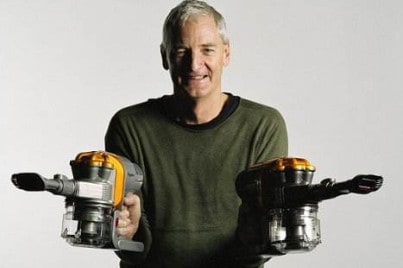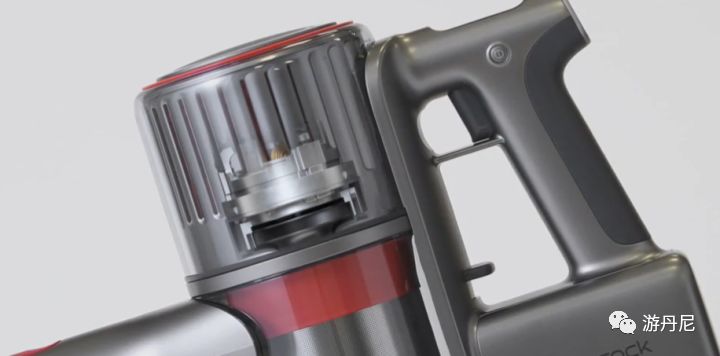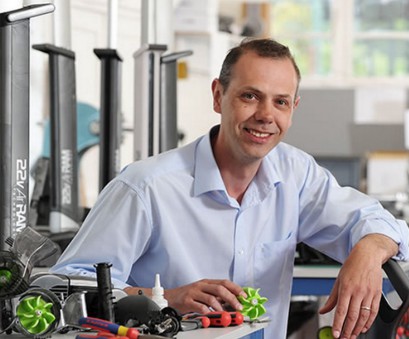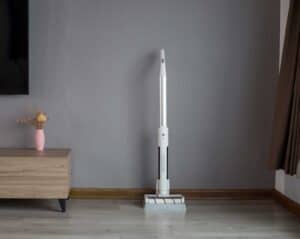Earlier today, one of my clients asked via email if EU rules on energy-efficiencywill change.
I read the materials he sent and learned Dyson won the lawsuitwith the European Commission, meaning the EU energy efficiency regulations in action may change.
Related news has come out online.

As early as five years ago, the European Union introduced new energy efficiency standards for vacuum cleaners driven by German vacuum makers.
To put it simply, people tend to misunderstand “high power = large suction = high dust removal capacity”, despite the fact that a string of factors affect the performance of a vacuum:
1. The performance of the motor itself. Two motors with the same power may vary a lot as the one with high battery energy consumption may have limited output power, which can’t be distinguished based on previous standards.
2. Ground brush. Most ground brushes applied to ordinary household vacuum cleaners are not optimized, which prove inferior in the sealing performance, adding to air leakage.
3. The sealing performance of the vacuum. Poor sealing of a vacuum relates to a low suction power.
In summary, high-powered motor does not stand for high dust-removing capacity, as much as to say high fuel consumption does not equal to adequate horsepower.
The EU stressed several test standards in the new energy efficiency rules, adding quantifiable indicators, to enable consumers to distinguish intuitively.
1. Energy consumption
2. Energy Class
3. Dust Pick up on Hard floor
4. Dust Pick up on Carpet
5. Dust re-emission
6. Noise
Each indicator is presented from A to G, with A representing the highest level, and G the lowest level. The higher the level, the better the performance.
Upon effect of the energy efficiency standards, all vacuums sold in the EU must be labeled with energy efficiency logo (labels and explanations are as follows).
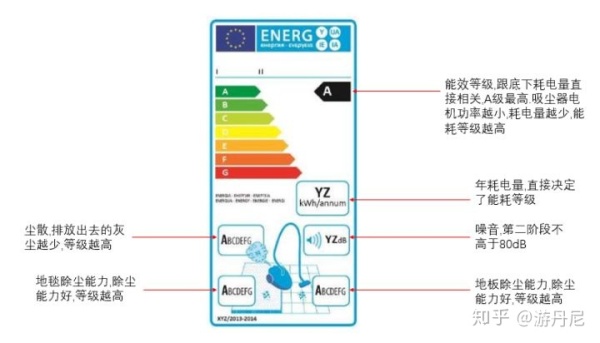
Dyson sued the European Commission for inappropriate test standards in the energy efficiency regulations as the test machine could not provide feedback in the actual use. In the energy efficiency test, the dust bag is empty, while in actual use, there is garbage in the dust bag, which may jam the channel and lower the overall performance level. Dyson complained in case a dust bag is jammed, the cleaning level will be reduced from A to G. In such as
test, the dust bag model will perform better than the one with the dust bucket, which means no difference to most vacuum makers as both models are made.
Dyson merely focuses on the dust bucket model.
Dyson actually suffered a lot. This is why Dyson has stood up to complain that the energy standards are under “German control” that are made deliberately to go against Dyson’s standards. Actually, it is more difficult for the dust bucket model to reach a higher level than the dust bag one.
Meanwhile, Dyson founder Sir James Dyson publicly claimed that the joint venture of German giants Bosch and Siemens faked in product testing,and sued Bosch Siemens for misleading consumers.
James Dyson said that “Bosch arms some models with built-in intelligent electronic control systems (Siemens Q80 and Bosch GL80), which will increase the power in an appropriate way (the power is increased from 750W to1600W when the dust bag is full). In this way, it gets a higher EU energy efficiency rating. This is the same as Volkswagen’s misbehavior in the exhaust.”
As such, in 2013, Dyson sued the European General Court for that the European Commission’s energy efficiency standards fail to reflect reality.
In 2015, the EU General Court rejected Dyson’s request, excluding the saying that current rules discriminate against Dyson products.
In 2016, Dyson appealed to the European Court of Justice (ECJ).The ECJ supported Dyson’s appeal and sent the case back to the EU General Court for retrial.
The General Court of the European Union ruled that Dyson’s appeal was valid this Thursday on November 8th. The original energy efficiency standards were misleading and would be abolished (all certifications must be renewed).
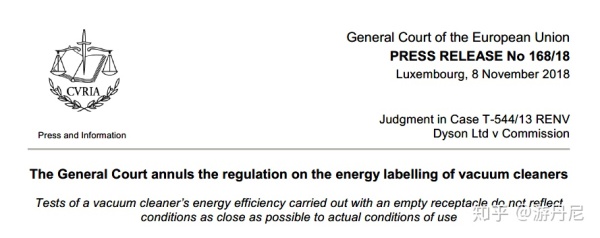
The European Court of Justice ruled that “vacuum energy efficiency tests using empty containers do not truly reflect real use.” Existing energy efficiency labels will remain valid for at least two months. Besides, a 10-day appeal period is allowed.
BSH (owner of Bosch Electric, Bosch and Siemens home appliance brands) claimed that “the impact of this ruling on vacuum cleaner manufacturers will be thoroughly analyzed.”
It is a victory for Dyson. Yet the impact is limited as this energy efficiency standard is aimed at products with power cords, while Dyson announced at the launch of its V10 this year that it will no longer develop new corded products
and instead focus on cordless models. Therefore, this five-year lawsuit is moresymbolic than practical to Dyson.
What is the impact on the vacuum cleaner industry?
Once previous energy efficiency standards are replaced by the new ones, basically all vacuum certifications must be re-applied, implying a heavy burden on vacuum makers and hit on further investments in this regard. To some extent, the EU’s ruling speeds up popularity of cordless vacuum cleaners.
On the other hand, it is good news to certification companies, as more businesses and more earnings will come along.

